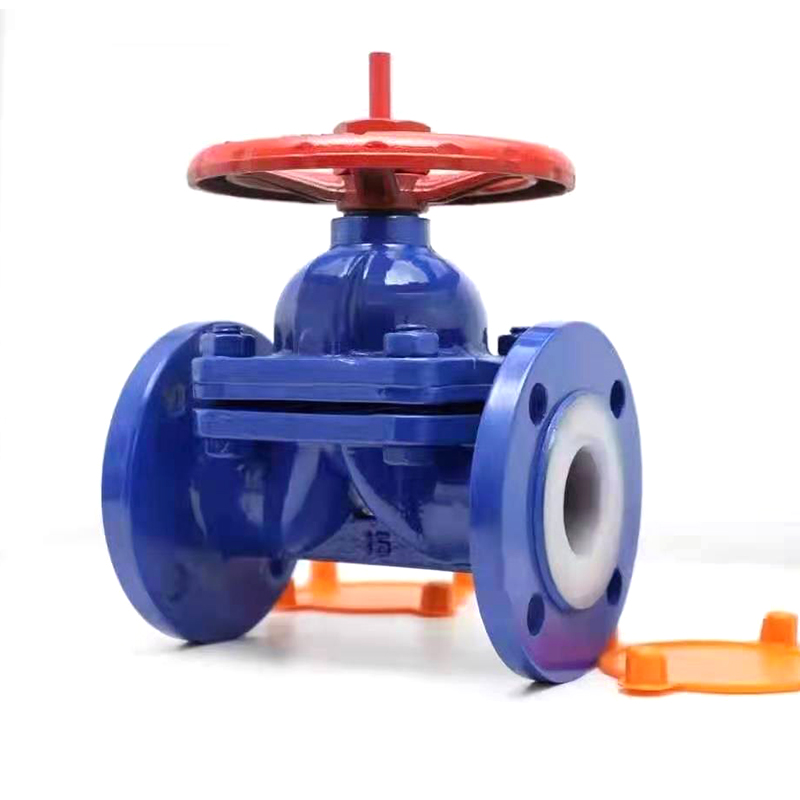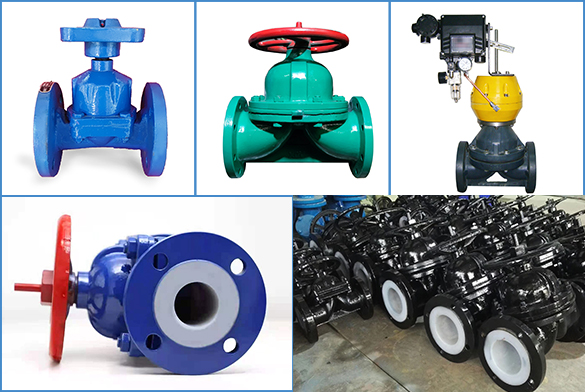What is a weir type diaphragm valve and its types
As a manufacturer of weir diaphragm valve, I hope this article will help you by explaining the definition and types of diaphragm valves.
What are Diaphragm Valves?
Diaphragm valves utilize a flexible diaphragm to obstruct, control, or isolate the flow of fluids. The diaphragm acts as the flow control element that flexes up or down to increase or decrease the fluid flow rate, respectively. The sealing action of the valve is created as the diaphragm is pressed onto the solid dam inside the valve body. Diaphragm valves are classified as linear motion valves, which require linear motion of the flow control element.

Diaphragm valves can handle liquids, gaseous fluids, and semi-solid media such as slurries, colloids, sludges, and brackish water well. These valves are ideal for handling liquids with solid particulate matter. Compared to other valves, they have a much simpler construction. Due to the minimal contact made by their internal components, the build-up of sediments and biofilms in diaphragm valves is less likely to occur. Hence, diaphragm valves are widely used in food and pharmaceutical manufacturing, water treatment, sewage pipelines and treatment plants, electronics manufacturing, and pulp and paper production.
Types of Diaphragm Valves
The two main types of diaphragm valves are the straight and weir through diaphragm valves, which only differ on the valve body and diaphragm design.
Straight Through Diaphragm Valve
Straight through diaphragm valves have a flat bottom valve body to reduce the impediment of the fluid flow. This makes the fluid flow in a straight pathway. To put the valve in a fully closed position, the diaphragm must touch the bottommost portion of the valve body. Therefore, straight-through diaphragm valves require a more flexible material for the diaphragm. Their diaphragm also needs more frequent replacement as they have a shorter service life.
Straight through diaphragm valves are suitable in handling semi-solid media such as slurries, sludges, and viscous fluids, which require only minimal obstruction on the flow path. These valves can also be used in a bi-directional flow since there will be no saddles blocking the flow path when the flow directions are switched.
Weir Diaphragm Valves

The weir-type design is the most popular diaphragm valve design.
Weir diaphragm valves have a raised lip or saddle into which the diaphragm presses to create a sealing action. Because of the raised lip, the amount of the diaphragm travel decreases from fully opened to a completely closed position. Hence, the stress induced in the diaphragm from closing the valve is reduced, and the diaphragm requires only a small amount of material. The diaphragm is usually made from a heavier material to make it suitable for vacuum and high-pressure applications.
Weir diaphragm valves are good in fluid flow control, even in small flow rates, and are widely used in throttling applications. They may utilize a two-piece compressor system to create a relatively small opening at the center of the valve. In this system, the inner compressor lifts the central portion of the diaphragm during the first increments of stem travel instead of the entire diaphragm. Once the inner compressor has fully opened, the outer compressor is lifted along with the inner compressor; this provides additional throttling to the flow.
Bonnet assemblies are recommended in handling dangerous fluids. The bonnet caps ensure that no fluid will be released to the surroundings in case the diaphragm fails. Diaphragm valves are also self-draining; hence it is recommended in food processing applications.
Weir diaphragm valves are commonly used in handling gases and clean and homogeneous liquids. This is because sediments can build up, and viscous liquids can gum up on either side of the saddle. They can also convey corrosive, hazardous, and abrasive media.
Tianjin KXC Metal Products Co., Ltd was established in 2004. We have been working in valves industry for 15 years. KXC Metal is an integrity valve manufacturer, who has own casting foundry, machining workshop and assembly line. We can control overall quality by ourselves and guarantee the lead time. The main products are butterfly valve, gate valve, check valve and control valves. We also offer OEM production of Valve Parts, including valve body, disc, seat, stem and other spare parts. Your inquiry is always welcomed at any time.
What are Diaphragm Valves?
Diaphragm valves utilize a flexible diaphragm to obstruct, control, or isolate the flow of fluids. The diaphragm acts as the flow control element that flexes up or down to increase or decrease the fluid flow rate, respectively. The sealing action of the valve is created as the diaphragm is pressed onto the solid dam inside the valve body. Diaphragm valves are classified as linear motion valves, which require linear motion of the flow control element.

Diaphragm valves can handle liquids, gaseous fluids, and semi-solid media such as slurries, colloids, sludges, and brackish water well. These valves are ideal for handling liquids with solid particulate matter. Compared to other valves, they have a much simpler construction. Due to the minimal contact made by their internal components, the build-up of sediments and biofilms in diaphragm valves is less likely to occur. Hence, diaphragm valves are widely used in food and pharmaceutical manufacturing, water treatment, sewage pipelines and treatment plants, electronics manufacturing, and pulp and paper production.
Types of Diaphragm Valves
The two main types of diaphragm valves are the straight and weir through diaphragm valves, which only differ on the valve body and diaphragm design.
Straight Through Diaphragm Valve
Straight through diaphragm valves have a flat bottom valve body to reduce the impediment of the fluid flow. This makes the fluid flow in a straight pathway. To put the valve in a fully closed position, the diaphragm must touch the bottommost portion of the valve body. Therefore, straight-through diaphragm valves require a more flexible material for the diaphragm. Their diaphragm also needs more frequent replacement as they have a shorter service life.
Straight through diaphragm valves are suitable in handling semi-solid media such as slurries, sludges, and viscous fluids, which require only minimal obstruction on the flow path. These valves can also be used in a bi-directional flow since there will be no saddles blocking the flow path when the flow directions are switched.
Weir Diaphragm Valves

The weir-type design is the most popular diaphragm valve design.
Weir diaphragm valves have a raised lip or saddle into which the diaphragm presses to create a sealing action. Because of the raised lip, the amount of the diaphragm travel decreases from fully opened to a completely closed position. Hence, the stress induced in the diaphragm from closing the valve is reduced, and the diaphragm requires only a small amount of material. The diaphragm is usually made from a heavier material to make it suitable for vacuum and high-pressure applications.
Weir diaphragm valves are good in fluid flow control, even in small flow rates, and are widely used in throttling applications. They may utilize a two-piece compressor system to create a relatively small opening at the center of the valve. In this system, the inner compressor lifts the central portion of the diaphragm during the first increments of stem travel instead of the entire diaphragm. Once the inner compressor has fully opened, the outer compressor is lifted along with the inner compressor; this provides additional throttling to the flow.
Bonnet assemblies are recommended in handling dangerous fluids. The bonnet caps ensure that no fluid will be released to the surroundings in case the diaphragm fails. Diaphragm valves are also self-draining; hence it is recommended in food processing applications.
Weir diaphragm valves are commonly used in handling gases and clean and homogeneous liquids. This is because sediments can build up, and viscous liquids can gum up on either side of the saddle. They can also convey corrosive, hazardous, and abrasive media.
Tianjin KXC Metal Products Co., Ltd was established in 2004. We have been working in valves industry for 15 years. KXC Metal is an integrity valve manufacturer, who has own casting foundry, machining workshop and assembly line. We can control overall quality by ourselves and guarantee the lead time. The main products are butterfly valve, gate valve, check valve and control valves. We also offer OEM production of Valve Parts, including valve body, disc, seat, stem and other spare parts. Your inquiry is always welcomed at any time.

Comments
Post a Comment